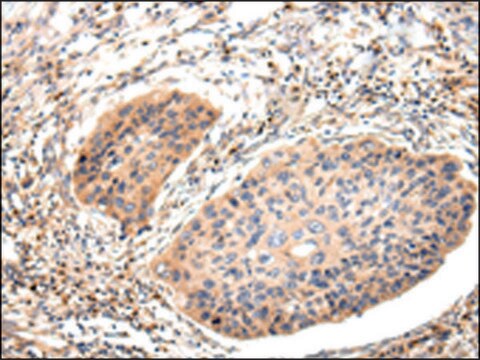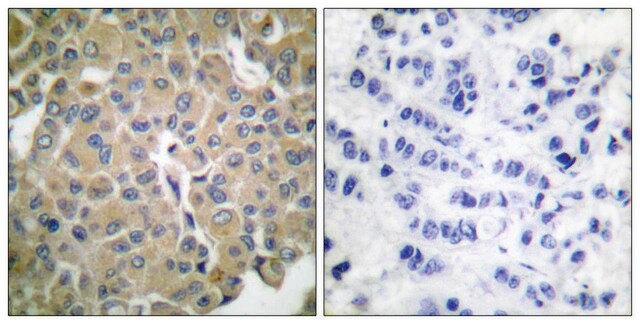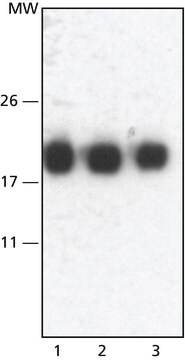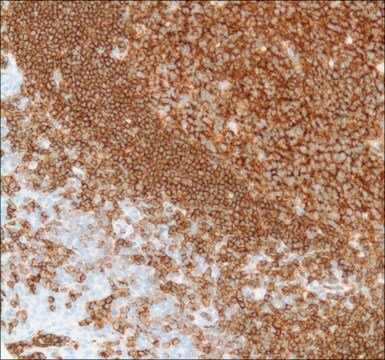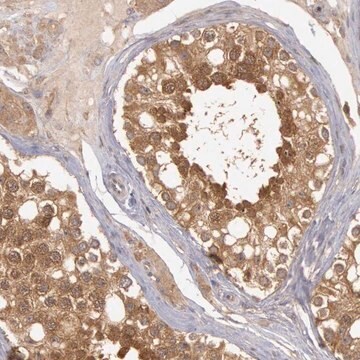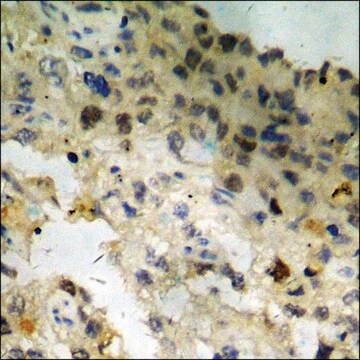MABF3201
Anti-MART-1/Melan-A Antibody, clone A103
Synonym(s):
Antigen LB39-AA, Antigen SK29-AA, Melanoma antigen recognized by T-cells 1, Protein Melan-A
About This Item
Recommended Products
biological source
mouse
Quality Level
antibody form
purified antibody
antibody product type
primary antibodies
clone
A103, monoclonal
mol wt
calculated mol wt 13.16 kDa
observed mol wt ~16 kDa
purified by
using protein G
species reactivity
human
packaging
antibody small pack of 100 μL
technique(s)
immunohistochemistry (formalin-fixed, paraffin-embedded sections): suitable
western blot: suitable
isotype
IgG1κ
epitope sequence
Unknown
Protein ID accession no.
UniProt accession no.
storage temp.
2-8°C
Gene Information
human ... MLANA(2315)
General description
Specificity
Immunogen
Application
Evaluated by Western Blotting in SK-MEL-28 cell lysate.
Western Blotting Analysis: A 1:500 dilution of this antibody detected MART-1 in SK-MEL-28 cell lysate.
Tested applications
Western Blotting Analysis: A representative lot detected MART-1 in Western Blotting applicaiton. (Chen, Y.T., et al. (1996). Proc Natl Acad Sci USA. 93(12); 5915-9).
Immunohistochemistry Applications: A representative lot detected MART-1/Melan-A in Immunohistochemistry applications (Chen, Y.T., et al. (1996). Proc Natl Acad Sci USA. 93(12);5915-9).
Note: Actual optimal working dilutions must be determined by end user as specimens, and experimental conditions may vary with the end user.
Physical form
Storage and Stability
Other Notes
Disclaimer
Not finding the right product?
Try our Product Selector Tool.
Storage Class Code
13 - Non Combustible Solids
WGK
WGK 1
Flash Point(F)
Not applicable
Flash Point(C)
Not applicable
Certificates of Analysis (COA)
Search for Certificates of Analysis (COA) by entering the products Lot/Batch Number. Lot and Batch Numbers can be found on a product’s label following the words ‘Lot’ or ‘Batch’.
Already Own This Product?
Find documentation for the products that you have recently purchased in the Document Library.
Our team of scientists has experience in all areas of research including Life Science, Material Science, Chemical Synthesis, Chromatography, Analytical and many others.
Contact Technical Service